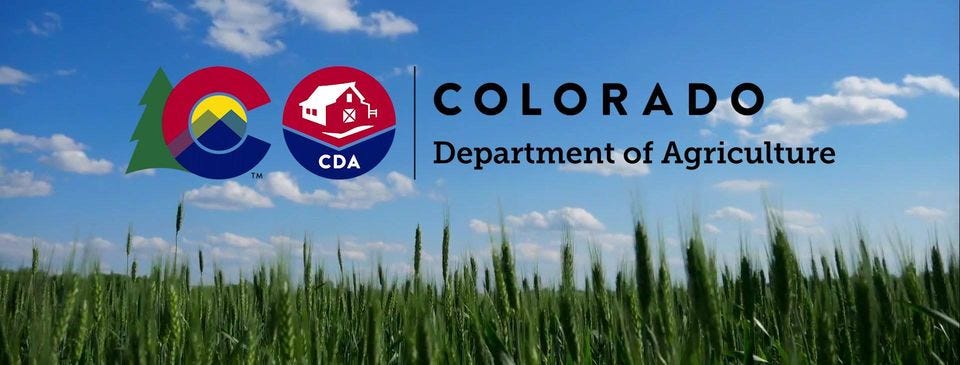Colorado Department of Agriculture Orders Mandatory Weekly Bulk Milk Testing for H5N1
Penn State University Dairy Herd now under voluntary monitoring (no clinical signs)
Colorado agricultural officials continue to take the “cow by the horns” in their battle with an outbreak of H5N1 in dairy herds and poultry flocks in the northeast part of the state. Yesterday the following order signed by State Veterinarian Dr. Maggie Baldwin was posted to take effect as of 7/22/2024:
Dairy HPAI Order of Statewide Mandatory Testing.pdf - Google Drive
Here is the text of the order:
Pursuant to section 35-50-109(2), C.R.S., the Commissioner of Agriculture, by her designee, the Colorado State Veterinarian, hereby issues this Order of Mandatory Testing (“Order”).
As of the effective date of this Order, all CDPHE-licensed dairy cow farms in the state of Colorado must submit weekly bulk-tank samples for testing as set forth below.
For purposes of this Order, a “Colorado CDPHE licensed dairy cow farm” means any premises with lactating dairy cattle that produces fluid milk, butter, pasteurized cheese and cheese products, frozen desserts, ice cream, pasteurized ice cream, dry whole milk, nonfat dry milk, dry buttermilk, dry whey, evaporated milk (whole or skim), condensed whole milk (excluding sweetened condensed milk), condensed skim milk, cottage cheese, dry curd cottage cheese, low-fat cottage cheese, and other such products for human consumption.
Pursuant to this Order of Mandatory Testing:
Weekly bulk-tank samples must be collected from every CDPHE-licensed dairy cow farm in Colorado that is not under any separate order of quarantine or order for testing;
Dairies released from HPAI quarantines while this Order is in place will be subject to weekly testing under this Order.
Such samples must be collected by CDPHE-certified collection samplers on a weekly basis;
Such collected samples must be submitted to the CSU Veterinary Diagnostic Laboratory by the sampler; and
Any dairy that has a non-negative bulk tank test result will be placed under quarantine pursuant to section 35-50-111(3), C.R.S., under terms and conditions that will be set forth separately in an order of quarantine.
All dairy producers must comply with all epidemiologic investigation requirements established by the State Veterinarian or her designee.
This Order shall remain in effect unless it be modified, vacated, or otherwise released by subsequent order of the Commissioner of Agriculture, the Colorado State Veterinarian, or an authorized representative thereof.
This is a lawful order of the Commissioner of Agriculture, Colorado Department of Agriculture. Any failure or refusal to comply will result in immediate referral to the Colorado Office of the Attorney General for civil enforcement and to local law enforcement for criminal enforcement.
So ordered this 22nd day of July 2024.
This is a big step in understanding several questions regarding H5N1 in both previously and newly dairy herds over time:
How long (average, median, and range) do herds remain PCR milk positive once diagnosed?
As herds test positive, when do clinical signs appear relative to positive milk samples? Does close examination of other animals in the herd show any evidence of subtle clinical illness as milk becomes positive? Do respiratory samples also test positive prior to signs of clinical mastitis and systemic illness in lactating cows?
Do recovered herds later break with H5N1 infections? If so, does sequencing indicate the new infection to be ongoing from the prior infection, or a new infection from outside the herd? This is why the provision that herds released from quarantine continue to test was such a critically important requirement in the order!
These requirements may be looked at as somewhat onerous; however, both researchers and herd veterinarians will finally have some ongoing data to assist herd owners in understanding within herd infection over time.
Getting a handle on state prevalence and risk in untested herds may be the most obvious intent of the order; however, the real benefits will accrue to those who choose to use this “free” status information to understand infection dynamics within their herds.
Penn State is one of many universities controlling dairy herds for research and educational purposes. Yesterday they announced their intentions to enroll their herd in regular H5N1 herd testing, as encouraged by USDA:
This is a great proactive step by a land grant university in doing the right thing as an educational step for producers on their state. Hopefully every other university with dairy herds receiving state and federal funding for agricultural education and research will emulate this example by testing herds under their control to show support for animal health and zoonotic surveillance activities.
John





Remind me, why are we doing this? Because cows produce less milk for a week, then recover? Because some dairy workers have a pink eye for a day, then recover? A PCR test alone has never been a conclusive diagnosis for acute illness and never will be. What this will accomplish, is that many false positives will be detected and herds will be placed under quarantine for no reason, putting further stress on the food supply chain... for no reason.